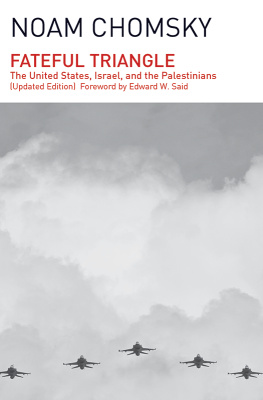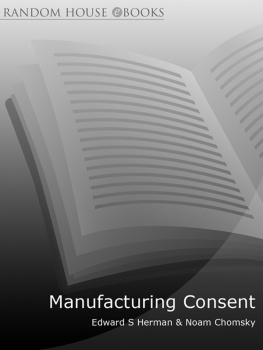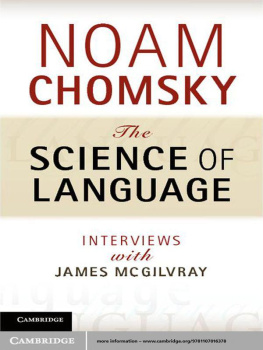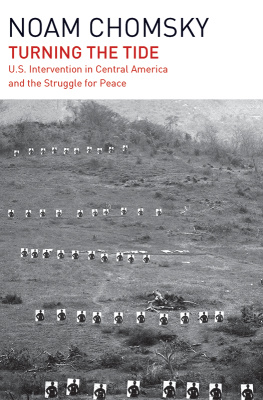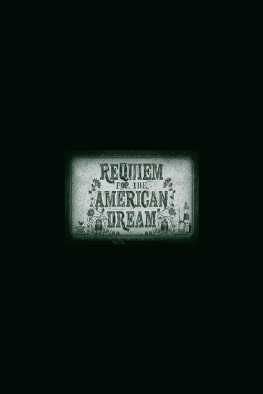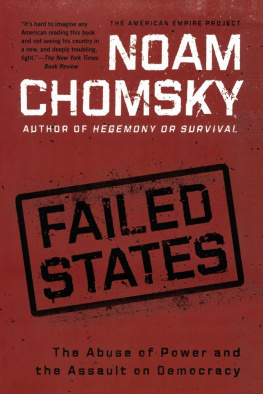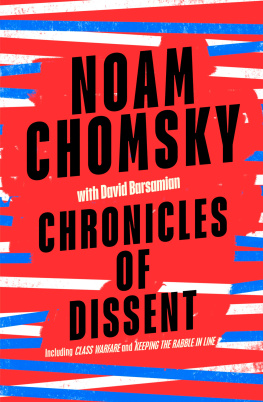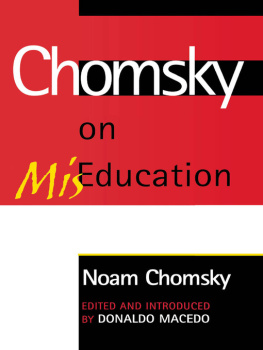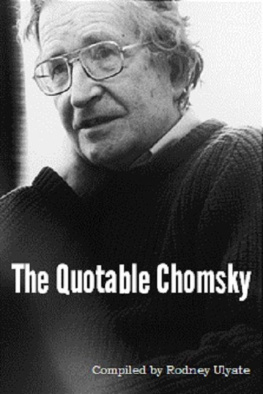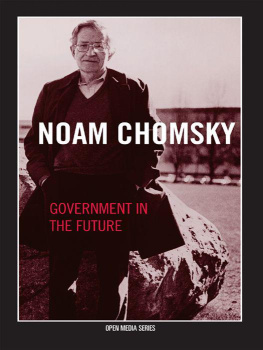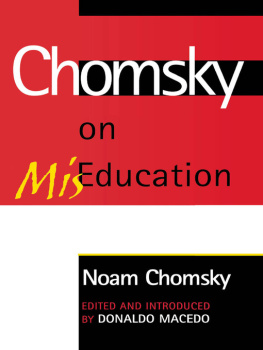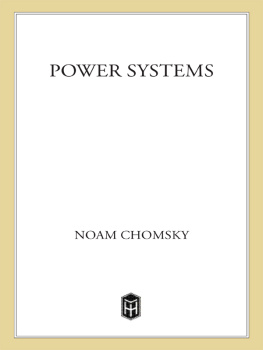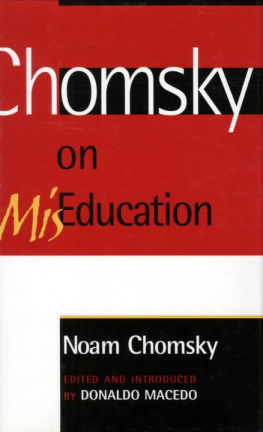Noam Chomsky - The Chomsky Reader
Here you can read online Noam Chomsky - The Chomsky Reader full text of the book (entire story) in english for free. Download pdf and epub, get meaning, cover and reviews about this ebook. year: 1987, publisher: Pantheon, genre: Politics. Description of the work, (preface) as well as reviews are available. Best literature library LitArk.com created for fans of good reading and offers a wide selection of genres:
Romance novel
Science fiction
Adventure
Detective
Science
History
Home and family
Prose
Art
Politics
Computer
Non-fiction
Religion
Business
Children
Humor
Choose a favorite category and find really read worthwhile books. Enjoy immersion in the world of imagination, feel the emotions of the characters or learn something new for yourself, make an fascinating discovery.

- Book:The Chomsky Reader
- Author:
- Publisher:Pantheon
- Genre:
- Year:1987
- Rating:3 / 5
- Favourites:Add to favourites
- Your mark:
- 60
- 1
- 2
- 3
- 4
- 5
The Chomsky Reader: summary, description and annotation
We offer to read an annotation, description, summary or preface (depends on what the author of the book "The Chomsky Reader" wrote himself). If you haven't found the necessary information about the book — write in the comments, we will try to find it.
The Chomsky Reader — read online for free the complete book (whole text) full work
Below is the text of the book, divided by pages. System saving the place of the last page read, allows you to conveniently read the book "The Chomsky Reader" online for free, without having to search again every time where you left off. Put a bookmark, and you can go to the page where you finished reading at any time.
Font size:
Interval:
Bookmark:
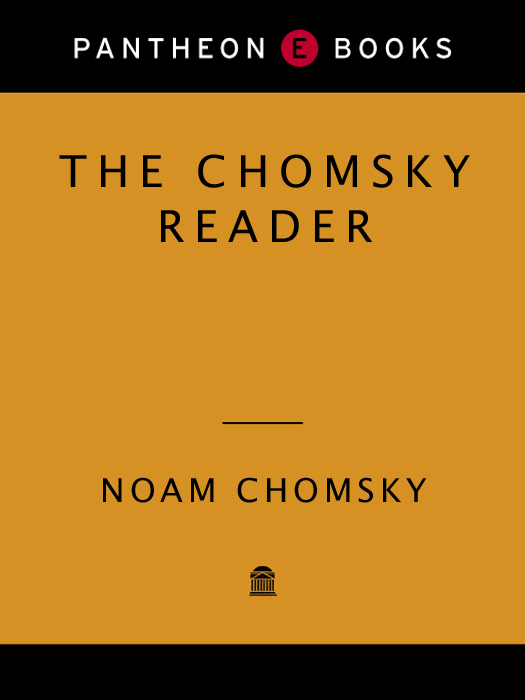

AMERICAN POWER AND THE NEW MANDARINS
AT WAR WITH ASIA
Essays on Indochina
PROBLEMS OF KNOWLEDGE AND FREEDOM
The Russell Lectures
FOR REASONS OF STATE
PEACE IN THE MIDDLE EAST?
Reflections on Justice and Nationhood
REFLECTIONS ON LANGUAGE
LANGUAGE AND RESPONSIBILITY
TOWARDS A NEW COLD WAR
Essays on the Current Crisis and How We Got There

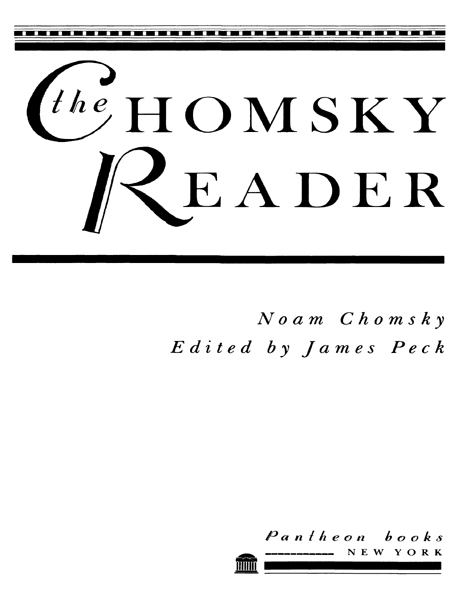
Compilation and interview Copyright 1987 by Noam Chomsky
Introduction Copyright 1987 by James Peck
All rights reserved under International and Pan-American Copyright Conventions. Published in the United States by Pantheon Books, a division of Random House, Inc., New York, and simultaneously in Canada by Random House of Canada Limited, Toronto.
Grateful acknowledgment is made to the following for permission to reprint previously published material:
PANTHEON BOOKS, A DIVISION OF RANDOM HOUSE, INC.: The Responsibility of Intellectuals, pp. 32359, and Objectivity and Liberal Scholarship, pp. 23126, from American Power and the New Mandarins by Noam Chomsky. Copyright 1967, 1969 by Noam Chomsky. Vietnam and United States Global Strategy, pp. 3166, The Mentality of the Backroom Boys, pp. 66100, excerpts from Psychology and Ideology, pp. 31865, and Language and Freedom, pp. 387406, from For Reasons of State by Noam Chomsky. Copyright 1970, 1971, 1973 by Noam Chomsky. Excerpts from pp. 26212 of Towards a New Cold War by Noam Chomsky. Copyright 1982 by J. Leonard Schatz, Trustee of the Chomsky Childrens Trust #2. Reprinted by permission of Pantheon Books, a division of Random House, Inc.
SOUTH END PRESS: Nicaragua and Guatemala from Turning the Tide by Noam Chomsky; The Middle East from The Fateful Triangle by Noam Chomsky. Reprinted by permission of the publisher, South End Press, 116 St. Botolph Street, Boston, Mass., 02115.
UNIVERSITY OF ILLINOIS PRESS: Equality from Equality and Social Policy by Noam Chomsky. Copyright 1978 by The Board of Trustees of The University of Illinois. Reprinted by permission of the University of Illinois Press.
Library of Congress Cataloging-in-Publication Data
Chomsky, Noam
The Chomsky reader.
1. United StatesForeign relations1945
I. Peck, James, 1944- II. Title.
E840.C47 1987 327 73 86-42975
eISBN: 978-0-307-77249-7
v3.1
INTELLECTUALS
AND THE WORLD
The American Invasion of South Vietnam
To confront a mind that radically alters our perception of the world is one of lifes most unsettling yet liberating experiences. Unsettling because it can undercut carefully constructed rationales, liberating because at last the obvious is seen for what it is. However troubling reality may be, human dignity is not affirmed in fleeing it. Rather, dignity lies in seeing reality for what it isand acting responsibly in the face of it.
In all American history, no ones writings are more unsettling than Noam Chomskys. He is among our greatest dissenters. No intellectual tradition quite captures his voice; thinking within traditions is anathema to him. No party claims him; he is a spokesman for no ideology. His position is not a liberalism become radical, or a conservatism in revolt against the betrayal of claimed principles. It is an indication of the radical nature of his dissent that it fits nowhere.
Such a radical stance is hard to sustain. Even our most famous dissenters have often turned back from what they saw. Their insights became too painful. Many lapsed into despair, lamenting as did Mark Twain the follies of human nature, or as did Henry Adams the failure of the American promise.
But Chomsky does not turn back. He relentlessly pursues what he sees. No one has exposed more forcefully the self-righteous beliefs on which Americas imperial role is based, or delineated more effectively the appalling actions which maintain it. No one has focused more compellingly on the violence of our world, or conveyed more directly the responsibility of the United States for much of it. Few have so carefully dissected how Americas acclaimed freedoms mask its irresponsible power and unjustified privilege.
Chomskys insights, though forbidding in their intensity, bring that sense of relief that comes when someone speaks the truth directly. That relief was palpable among Chomskys readers in the 1960s and 1970s when the war raged in Vietnam. Bluntly, unsparingly, he marshaled the evidence and described the brutal realities of the warAmerican aggression, genocide, war crimes, mass murder. He showed us how these realities were carefully homogenized and sanitized on the evening news to make them acceptable to the powers that be. And he asked why this was so.
His answer is shocking at first: there is a pervasive, omnipresent ideological process of indoctrination that permeates American life, makes us immune to the suffering all around us, and blinds us to what is all too obvious. In these writings, Chomsky explores logically and methodically how the process works. As he looks at its workings in Vietnam, Central America, and the Middle East, he makes us confront the way in which the very foundations of American civilization and its economic life are at war with the prospects for human dignity and freedomhere and abroad.
His tenacity is extraordinary. It is there in the skillfully crafted logical character of his writings, the careful gathering of evidence, the undiminished ardor over the years to expose the mystifications so continually used to conceal the truth. It is there as well in his outpouring of writings for even the smallest journals, in his determination through countless speaking engagements to reach any audience willing to listen. In the early days of the antiwar movement, Chomsky willingly came and spoke with just a handful of people, with students in all disciplinesfrom physics to Asian studiesurging them to use their minds and not just their bodies to oppose the war; to not have illusions about Americas aggression in Vietnam, or the long-term character of the struggle to end it; to not seek easy alternative faiths in other countries: not in Castros Cuba, or Ho Chi Minhs Vietnam, or Maos China.
Today Chomsky draws large audiences of college students never exposed to his writings about Vietnam. But his impact is comparable: his direct portrayal of U.S. policy around the world communicates a sense that people can see if they care to, if they step back just long enough to question the ideological milieu which shapes them.
Now as then, his is not the counsel of despair. True, Chomsky does not believe that the truth by itself will simply win out, given the realities of power he describes. But he refuses to turn from analyzing the reasons for the evils and horrors of our time, for they are neither unknowable nor intractable. They are all too understandable. Otherwise so many efforts would not be undertaken to deflect such realities, much as the psyche deflects painful truths deeply known within, but for that reason consciously denied all the more fervently as irrelevant.
Font size:
Interval:
Bookmark:
Similar books «The Chomsky Reader»
Look at similar books to The Chomsky Reader. We have selected literature similar in name and meaning in the hope of providing readers with more options to find new, interesting, not yet read works.
Discussion, reviews of the book The Chomsky Reader and just readers' own opinions. Leave your comments, write what you think about the work, its meaning or the main characters. Specify what exactly you liked and what you didn't like, and why you think so.

